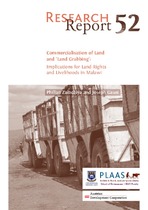Commercialisation of land and ‘Land Grabbing': Implications for Land Rights and livelihoods in Malawi
Abstract
This study investigates the processes and
impact of commercialisation of land in Malawi
– specifically the acquisition of huge tracts
of communal lands by foreign companies and
local elites for sugarcane production in Nkhotakota
and Chikwawa districts. The main finding
was that ‘land grabbing’ for large-scale
commercial agriculture in these two districts
negatively affected the livelihoods of the poor
communal farmers. The costs to the affected
communities outweighed the benefits.
In the two districts studied, land grabbing
was driven by a weak communal tenure legal
framework and the Malawi government’s
support for large-scale agro-investments. The
key players behind land grabbing were local
elites, traditional leaders, foreign companies,
international agencies, the coercive apparatus
of the state – the police and army – and
politicians. The land acquisition processes
in both districts were violent and arbitrary,
with no compensation offered to the displaced
communities. The way in which the
land was acquired resulted in the destruction
of people’s properties, crops and household
incomes, leading to increased food insecurity
and poverty among the rural poor. Even
though Malawi is a signatory to international
land governance frameworks1, there was a
disjuncture between policy and practice due
to the players not complying with the statutes.

